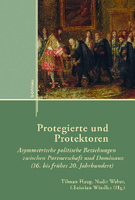Protegierte und Protektoren
Asymmetrische politische Beziehungen zwischen Partnerschaft und Dominanz (16. bis frühes 20. Jahrhundert)
Contributor(s)
Haug, Tilman (editor)
Weber, Nadir (editor)
Collection
Knowledge Unlatched (KU)Number
104120Language
GermanAbstract
Protektion ist ein Schlüsselbegriff der politisch-sozialen Sprache der europäischen Neuzeit. Der Band rückt die sich wandelnden Semantiken und Praktiken des Schutzes vom 16. bis frühen 20. Jahrhundert erstmals systematisch in den Blick. Die Beiträge spannen einen weiten Bogen von Jean Bodins Definition von Protektion als ungleiche Allianz über das völkerrechtliche Institut des Protektorats bis hin zu den gegenwärtigen Debatten um eine responsibility to protect. Ausgewählte Fallbeispiele zeigen auf, dass politische Schutzverhältnisse nicht nur ein Macht- und Legitimationsinstrument der Großen waren. Sie stellten auch eine Option für mindermächtige Akteure dar, um ihre Unabhängigkeit zu wahren oder sich gegen Übergriffe des eigenen Herrschers zur Wehr zu setzen. Zugleich konnte die erlangte Sicherheit jedoch stets wieder in den Verlust der eigenen Selbständigkeit münden.
Keywords
History; Politische Theorie der Frühen Neuzeit; Europäische Außenbeziehungen; Fremde Rechtsräume; Moderne; DiplomatieDOI
10.7788/9783412506766ISBN
9783412506766OCN
1135856824Publication date and place
Köln, 2016Imprint
BöhlauClassification
European history


 Download
Download Web Shop
Web Shop